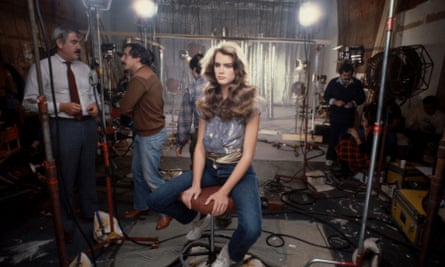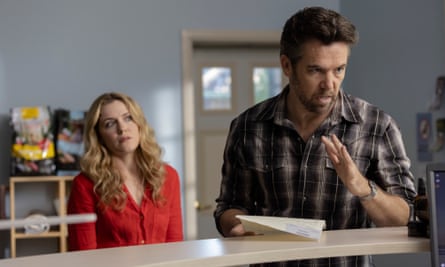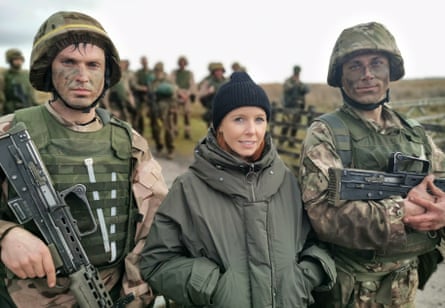Obsession (Netflix)
Why Didn’t They Ask Evans? (ITV) | ITVX
Pretty Baby: Brooke Shields (Disney+)
Colin from Accounts (BBC Two) | iPlayer
Many questions are pondered in the course of evaluating television drama, but “Am I sufficiently turned on?” may be a first for me. This is one way of announcing that Netflix, which brought you Sex/Life and Dark Desire, has produced yet more erotic TV. It’s Obsession, a four-part adaptation of the bestselling Josephine Hart novel Damage (previously made into Louis Malle’s 1992 film starring Jeremy Irons and Juliette Binoche).
Richard Armitage (The Stranger) plays William, a married, designer-stubbled surgeon going into politics, while Charlie Murphy (Happy Valley) is Anna, the enigmatic new squeeze of William’s son Jay (Rish Shah). When William and Anna meet, mutual smouldering ensues. An olive is eaten in a provocative manner. Before long they’re naked, clamped together like erotic Lego, on the fabulous polished floor of a borrowed flat. Elsewhere, they sombrely copulate in toilets; mechanically rut in alleyways. Rarely has a tempestuous affair been made to look like such a chore.
Obsession is beautifully shot, and via Morgan Lloyd Malcolm and Benji Walters’s script you occasionally get some sense of Anna’s inner life, her motivations, though not nearly enough. It’s left to Indira Varma, as William’s wife, Ingrid, to burn up the screen with emotion. Anna and William are mainly about the sex scenes, which seem to arrive in Bogof batches. Clearly, intimacy coordinators are working overtime, but that’s not the problem. While the obsession is overdone (William, especially, is drenched in it like cloying duty-free aftershave), the sex itself, including what appears to be a beginner’s guide to bondage and submission, seems stilted. It’s like watching AI sex robots attempt to play strip Twister.
Is this the recurring issue with sexed-up dramas? They aim to be erotica – intense, nuanced – but somehow end up being… what, exactly? Apologetic porn? Skin flicks with caveats? Maybe it’s simply that this blankly intensive sex-first approach has dated. Shows such as The White Lotus have upped the ante: leading so firmly with character/story that sex arrives like a riotous, transgressive comet. Compared to that, Obsession is unlikely to be anyone’s turn-on.
Over to ITV1 for a three-part dramatisation of the 1934 Agatha Christie whodunnit Why Didn’t They Ask Evans? First shown last year on BritBox, it’s written and directed by Hugh Laurie, who also plays a doctor.
Laurie has some front taking on Christie: the simplicity of her stories is deceptive, and diehard fans like myself aren’t averse to reaching for their Basildon Bond notepads to fire off complaints should liberties be taken. Happily, Laurie pulls it off. While there are some non-Christie moments (photos coming “alive”; Hitchcockian camera swoops), they nestle well in a whodunnit that takes full advantage of glorious scenery, from Surrey to Wales, and a perfectly pitched cast that includes Conleth Hill and Daniel Ings, with cameos from Emma Thompson, Jim Broadbent and Paul Whitehouse.
The two leads also fulfil the brief: as Bobby Jones, Will Poulter is all freckled, plucky decency as he finds a dying man at the bottom of a cliff, croaking out the title of the mystery. Bobby is joined in amateur sleuthing by former childhood friend, putative love interest and quintessential Christie heroine Lady Frances (Frankie), played by Lucy Boynton as an aristo-tomboy, with flashing eyes and hands thrust into the pockets of her daring slacks.
This is Christie 101, complete with nostalgia triggers: iron bicycles, red telephone boxes that haven’t been urinated in, even some chloroforming. The only drawback – a sizeable one – is Why Didn’t They Ask Evans? itself: not one of Christie’s strongest outings, and it has a decidedly lacklustre denouement. If Laurie goes Christie again, he needs to show her at her bravura best, digging those sharp tools deep into the rotten wood of human psychology.
Pretty Baby: Brooke Shields is the latest two-part docuseries from Lana Wilson (After Tiller; Miss Americana). As much as it’s about Shields (the child actor-model; her alcoholic “momager”, Teri; her rape as a young woman after a work-meeting dinner; her first marriage, to tennis player Andre Agassi), it’s also about the late 20th-century culture that simultaneously celebrated, chastised and objectified her.
Pretty Baby refers to the 1978 film (Malle again) about a New Orleans brothel in 1917, in which a 12-year-old girl’s virginity is auctioned off (Shields was 11 at the time of filming). The Pretty Baby clips are discomfiting, but no more so than Shields as a child being flirted with in interviews, the heightened sexual innuendo of her teenage Calvin Klein adverts and early films (Blue Lagoon, Endless Love), or the hyper-public circus made of her own virginity.

Whatever Madonna-whore complex western society was grappling with during this era, Shields bore the brunt of it. It’s sad to think what a skilled compartmentaliser she must have been. Yet here she is, decades later, in Wilson’s documentary, not only with a lovely family (her two spirited daughters are aghast at her treatment), but also composed, open, sparky – the antithesis of self-pity. There’s too much thematic repetition in the second episode, but this is an absorbing profile, with unexpected interviewees (Laura Linney has been a friend since childhood). It leaves you rooting for Brooke: the child she was and the woman she became.
On BBC Two there’s the new Australian six-part comedy Colin from Accounts. Patrick Brammall and Harriet Dyer (married in real life) play brewer Gordon and student doctor Ashley. She flashes a boob as she crosses the road in front of his car, which leads to him injuring a dog. She then moves in with him as they nurse the dog, naming him Colin from Accounts.

As premises go, it’s preposterous, but that’s all part of the fun. In the two episodes I’ve seen, there’s everything from bathroom mishaps (“sleep-weeing”, anyone?) to waspish co-workers (“Late and intoxicated – the full disco, Ashley”) to eccentric parents (Ashley’s mum about Colin: “Is he broken?”). While Dyer provides left-field moxie, Brammall exudes a Seinfeld-esque straight-man-struggling-amid-kooks vibe. At times the writing needs to be sharper, and not quite so lavatorial, but this is winningly silly, lo-fi, character-led comedy with absurdist panache.
Star ratings (out of five)
Obsession ★★
Why Didn’t They Ask Evans? ★★★
Pretty Baby: Brooke Shields ★★★
Colin from Accounts ★★★
What else I’m watching
Stacey Dooley: Ready for War?
(BBC Three/BBC One)
Dooley meets ordinary non-military Ukrainians receiving intensive British army training in preparation for the frontline. This documentary is a grim reminder that the Russia-Ukraine conflict is many things, but it’s also a war fought by civilians.

Yonder
(Paramount Plus)
A South Korean sci-fi drama in which a grieving husband (Kim Jae-hyun) receives a message from his dead wife to go to a mysterious space where memories can be uploaded. For those who enjoy boldly mystical future-scapes.
The Marvelous Mrs Maisel
(Amazon Prime)
Fifth and final series of the high-energy dramedy about a female Jewish comedian (Rachel Brosnahan) working in the Lenny Bruce era. Inventive, perma-wisecracking, it still deserves every Emmy going.

